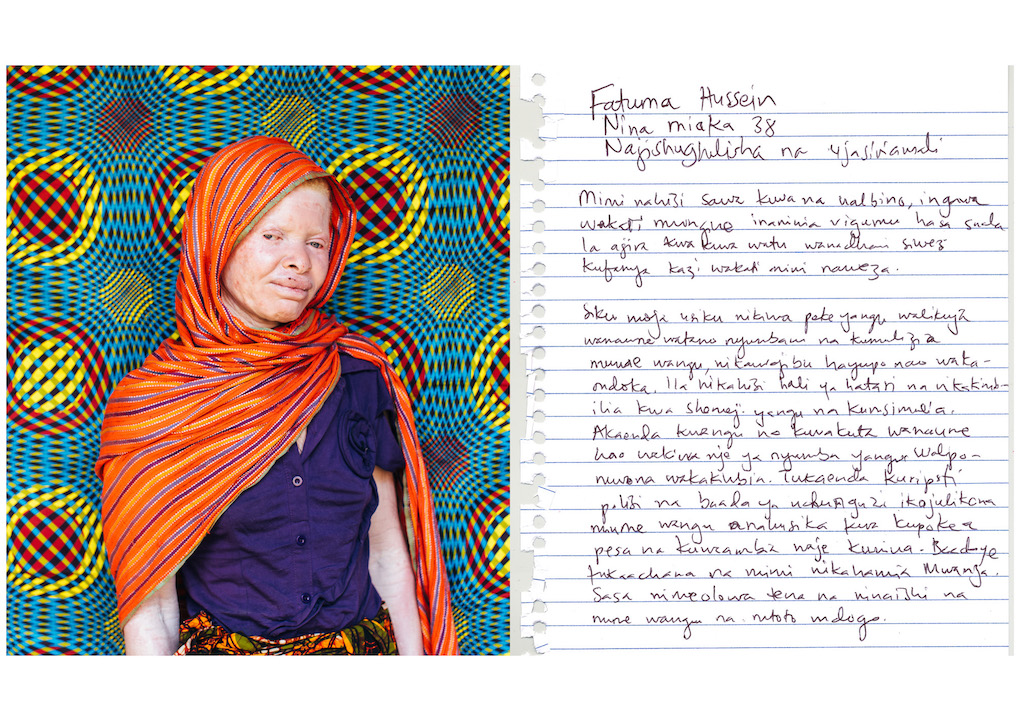
THE GHOST PEOPLE OF TANZANIA
Interview by
Soraya Matos
They are called, zeru zeru, which in Swahili translates to the ghost people - these are the persecuted people with albinism (PWA) in Tanzania.
Currently, Tanzania holds the world’s largest population of people living with albinism with 1 in every 1,400 individuals
.... But for country with such a large albinism population there is little awareness on the fact that albinism is a genetic condition. Witchcraft is at the root of Tanzanian culture, and ‘Albino elixir’ has become a formula of which witch doctors brew albino body parts fueling beliefs. They spread the lie that these potions bring wealth, power, and good fortune. As a result of these misconceptions, the albinism population lives under the daily threat of abuse, abductions, and ritual killings.
When human rights are ignored, the marginalization of certain persons within a society prevent such a group from becoming involved and benefitting from development. People with albinism have been rendered worthless by a society that denies their existence, yet their bodies hold a high commercial value for those that believe they hold magical power. These individuals live their entire life hidden. Hidden from the sun, hidden from light, hiddenfrom others, hidden in the shadow of the world.
This visual advocacy project "The Ghost People of Tanzania"explores the identities of 50 Tanzanian people with albinism
The aim for every photograph produced is to combat the discrimination and attacks against people with albinism through education and advocacy. To allow individuals to tell their own story rather than someone tell it for them drives towards breaking the cycle of injustice, poverty, and marginalization.
By pushing the boundaries of the medium, in the means of 300 large-scale diptychs, these photographs are displayed in communities throughout Tanzania as a means of a public space for an encounter between a subject and its audience. Through powerful testimony and public art, this project aims to create a bridge for Tanzanian society to become informed of the condition and advocate for the inclusive human rights of people with albinism. explores the identities of 50 Tanzanian people with albinism.
 Fatuma Hussein. I am 38 years old. Entrepreneur.
Fatuma Hussein. I am 38 years old. Entrepreneur. I feel normal to have albinism but sometimes it is especially difficult to obtain a job. People think I am incapable while the truth is that I can do almost anything.
One day I was alone at home and three men came and asked for my husband. I told them he was away on a work trip. Suddenly, I had a feeling that something did not feel right, so I ran to my brother-in- law's home which happened to be nearby and I told him of the incident. He went to my home and found three men waiting outside my house. When they saw him, they fled. We went to report to the police and through the investigation they discovered that my husband was also involved. He had allegedly sold me to the thugs so that they could kidnap and kill me for money. He was arrested but later released. My brother-in-law helped me prepare everything to divorce my previous husband. We are now separated and I was able to escape to Mwanza where I brought my children for a new life and have now remarried.}

Pendo Sengerema: I am 16 years old.
It was 9 pm and we were having our dinner, then three strangers came and we welcomed them, but immediately they asked to leave. Suddenly, those people came back and started chasing us. They caught me and pinned me down and chopped off my arm and ran away with it. Then my mother started screaming and neighbors came to help and took me to the hospital.

Emmanuel Festo
A drawing of his attack.

My name is Naila Omary Shaury and I am 23 years old. I am a Tanzanian with albinism.
In my life, ever since I was born I have been raised by my single mother alone. My father abandoned me because I was born with albinism.
In the community that I live in, many people consider me not a normal human being. They think I am unable to do work and they thought I don’t have the brains to study as other children do.
When I was in school there were some teachers who didn’t understand that I have a challenge of low vision, they couldn’t help me and so I went through a very hard time.
But my mother struggled for me and supported me and gave me hope, that I should never give up for all the things that happen to me.

Mariam Ibrahim: I am twelve years old.
I feel that albinism is a normal condition because I see myself just like other people, I am not isolated or discriminated. I want to tell society that do not discriminate people with albinism because we are also human beings, like other people, we all have equal rights and we need to be loved like everybody else.

Kevin Kulwa: I am 14 years old.
Since I came here (government center), I have never been back home for 7 years now.
I can’t go home because of my safety.
I wish to see my family again.
I can’t go home because I will be kidnapped by the thugs.

Advocacy posters placed outside the classroom of a local grade school – Mikocheni, Dar es Salaam, Tanzania.
